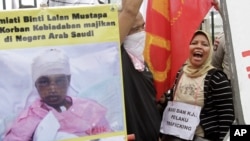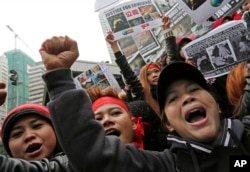Despite a new law and efforts by the government in Jakarta, activists say hundreds of thousands of Indonesian migrant workers are still vulnerable to abuse overseas.
In 2018, Indonesia sent more than 200,000 workers to places such as Saudi Arabia, Malaysia, Singapore, Taiwan and Hong Kong.
The Indonesian National Agency for the Protection and Placement of Migrant Workers (BNP2TKI) says there are about 4.5 million Indonesian migrant workers. The majority are in the domestic sector and 70 percent of them are women.
High-profile cases
There have been numerous reports over the years of Indonesian migrant workers suffering from abusive conditions overseas, and two recent cases have created an uproar.
Last month, Tuti Tursilawati was executed in Saudi Arabia after killing her employer for allegedly abusing her. In February, Adelina Lisao died after Malaysian authorities found her in critical condition in her employer's house. She was malnourished, with evidence of abuse on her body.
As of September 2018, BNP2TKI had received 18 complaints of physical or sexual violence by employers. Last year, there were 55 complaints.
Anis Hidayah, the head of migration research at Migrant Care, a nonprofit organization advocating for the rights of migrant workers, said many workers are in vulnerable position.
Preparation issues
Hidayah said there is not enough preparation for the workers before they leave.
"Pre-departure protection which includes education and preparation are crucial and might determine their fate while they work," she said. She said workers should be educated about where to go and what to do should anything unwanted happen to them.
But Nusron Wahid, the head of BNP2TKI, disputed the claim and said the government provides migrant workers with the necessary information before they go overseas.
"We start with preparation to build the workers' capacity so they are more capable and they will have a full understanding of what kind of job and the risks that they may face," he told VOA. At the agency, pre-departure preparation takes up to one month, from administration to briefing to capacity building.
Last year, the government issued an updated law on protection of Indonesian migrant workers, which states three conditions that a receiving country must meet. First, the country must have a law that protects foreign workers. Second, there needs to be a written agreement with the Indonesian government. And third, there must be a social security or insurance system that covers migrant workers.
The law also brings Indonesia under the International Convention on the Protection of the Rights of All Migrant Workers and Members of Their Families.
New process
Hidayah said the new regulation could reduce migrant worker vulnerability if fully implemented, "but the fact that the new law is more advanced than the previous law, that is still on paper.” Implementation, she said, “is an entirely different thing.”
Hidayah said there will be a two-year transition period as the new law is implemented, to allow technical regulations and policies to be set up. She explained that Indonesian regional governments must also prepare themselves, because the government in each regency, province or village can help in ensuring the protection of migrant workers.
Wahid said representatives of the Indonesian government, at embassies or consulates in receiving countries, are easily contacted in case any migrant workers want to lodge a complaint. "Twenty-four hours [a day], they can text or call," he said.
But he admitted that in a country such as Saudi Arabia, the migrant workers cannot initiate communication with government representatives as easily because of the culture. "Especially a female worker there, they mostly stay at home and have to be reclusive," he added.
Things are different in countries like Singapore, Hong Kong or Taiwan, where local laws and policies are more accommodating for migrant workers. "There they get one day off, then the workers can gather at a park or a station," he explained.
Wahid said the government is devising a one-channel system so that a migrant worker will not be tied to a contract with an individual employer, but with a company, through an outsourcing model. "Now when we have 100 cases, we are dealing with 100 people," he said.
With the new model, the company or agent must take full responsibility if anything happens to the workers.





